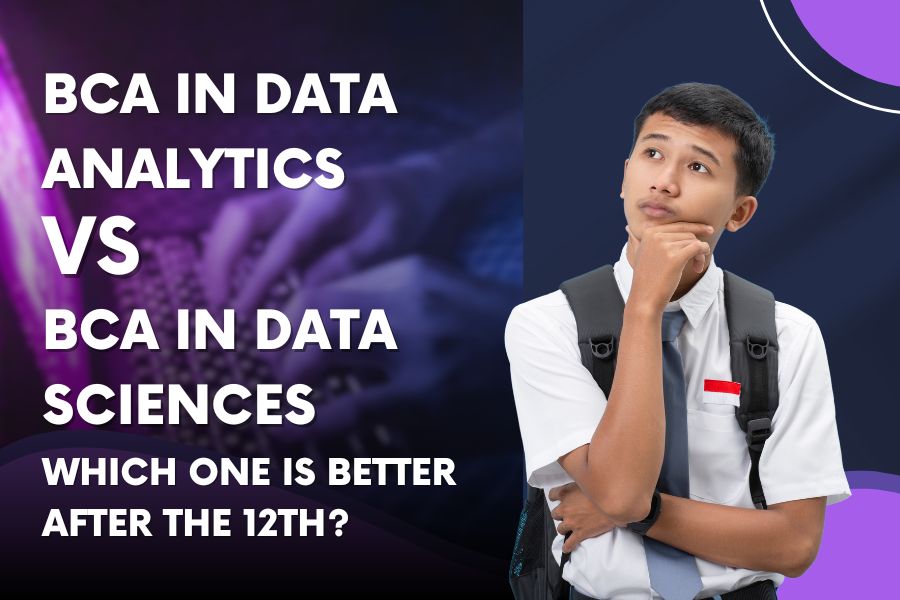
With the rapid growth of the digital economy and increasing reliance on data-driven decision-making, pursuing a career in data-related fields has become highly attractive for students. For those looking to delve into technology and data, Bachelor of Computer Applications (BCA) programs in Data Analytics and BCA in Data Science offer specialized avenues to build a promising career. But how do you choose between these two paths? Let’s explore each program in depth to help you decide which one is better for you after completing the 12th.
Understanding BCA in Data Analytics
BCA in Data Analytics focuses on equipping students with the knowledge and skills required to extract meaningful insights from large datasets. The program emphasizes:
- Core Subjects: Topics like statistics, data visualization, data mining, machine learning, and programming languages such as Python, R, and SQL are integral.
- Practical Training: Hands-on experience with tools like Tableau, Power BI, and advanced Excel.
- Applications: Analysis of data trends, making data-driven decisions, and presenting findings in business contexts.
Career Prospects in Data Analytics:
- Data Analysts
- Business Intelligence Analysts
- Marketing Analysts
- Data Visualization Specialists
Industries like e-commerce, finance, healthcare, and retail are prominent recruiters for data analytics professionals.
Understanding BCA in Data Sciences
BCA in Data Sciences is a broader field that encompasses data analytics but dives deeper into computational techniques and advanced data processing. The program covers:
- Core Subjects: Advanced programming, artificial intelligence (AI), big data technologies, predictive modeling, and deep learning.
- Research Focus: It includes advanced mathematical modeling and algorithm design.
- Applications: Building data-driven models for predictions, automating data processes, and developing AI-powered systems.
Career Prospects in Data Sciences:
- Data Scientists
- Machine Learning Engineers
- AI Specialists
- Research Analysts
Data science professionals are in high demand in technology companies, research organizations, and industries working on AI and innovation.
Comparing the Two Programs
| Aspect | BCA in Data Analytics | BCA in Data Sciences |
|---|---|---|
| Focus | Practical data analysis and visualization | Advanced computational and predictive modeling |
| Programming | Python, R, SQL, and data visualization tools | Python, Java, C++, and AI libraries |
| Career Path | Business-centric roles | Research and development-focused roles |
| Learning Curve | Easier for beginners | Requires strong mathematical and technical skills |
| Applications | Business decision-making | AI, automation, and big data |
Advantages of BCA in Data Analytics
- Business Orientation: Focuses on practical applications and decision-making in business contexts.
- Quick Job Readiness: Shorter learning curve, making it easier to transition into the workforce.
- Versatility: Applicable across multiple industries like marketing, operations, and consulting.
- Lower Entry Barrier: Requires less mathematical expertise compared to data sciences.
Advantages of BCA in Data Sciences
- Comprehensive Skillset: Covers data analysis, AI, and advanced programming.
- High Demand: Data scientists are among the most sought-after professionals globally.
- Future-Ready: Prepares students for cutting-edge technologies like AI, machine learning, and big data.
- Greater Earning Potential: Advanced technical skills lead to higher-paying job roles.
Factors to Consider Before Choosing
-
Your Interest and Aptitude:
- If you enjoy working with data patterns and visualizations but prefer less coding, Data Analytics might be ideal.
- If you’re intrigued by AI, algorithms, and problem-solving, Data Sciences could be a better fit.
-
Mathematical Skills:
- Data Science requires strong math and statistical aptitude.
- Data Analytics relies more on logical thinking and tools rather than deep mathematics.
-
Career Goals:
- Data Analytics is ideal for roles in business decision-making.
- Data Sciences suits those interested in research, AI, or working on complex data systems.
-
Industry Demand:
- Both fields have immense opportunities, but Data Sciences is more aligned with emerging technologies like AI and deep learning.
-
Future Growth:
- Data Sciences offers a broader scope for career growth due to its advanced nature.
- Data Analytics provides a faster route to enter the workforce and grow in managerial roles.
Conclusion: Which One is Better?
The choice between BCA in Data Analytics and BCA in Data Science depends on your interests, skills, and career aspirations. If you’re more inclined toward business applications and a quicker path to employment, BCA in Data Analytics is the way to go. On the other hand, if you’re passionate about AI, predictive modeling, and advanced computational techniques, BCA in Data Sciences will provide a deeper and more technical foundation.
Regardless of your choice, both fields promise a bright future in the data-driven world. Assess your strengths, explore the curriculum of each program, and envision where you see yourself excelling in the years to come. This decision could set the stage for a fulfilling and dynamic career in the world of data.














